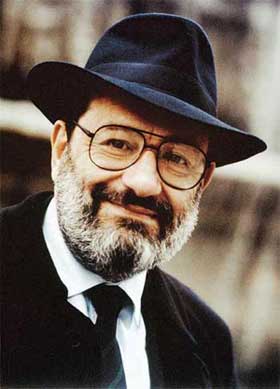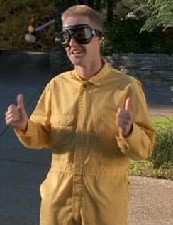Umberto Eco, Lesslie Newbigin, and Belief
 My friends and I have been discussing the article in the Daily Telegraph by Umberto Eco, famed Italian author and professor of semiotics at University of Bologna. Eco's article is entitled "God Isn't Big Enough For Some People" and in it he discusses the innate religious urge in people and his sadness at the dwindling of Christianity in Europe.
My friends and I have been discussing the article in the Daily Telegraph by Umberto Eco, famed Italian author and professor of semiotics at University of Bologna. Eco's article is entitled "God Isn't Big Enough For Some People" and in it he discusses the innate religious urge in people and his sadness at the dwindling of Christianity in Europe."Religions are systems of belief that enable human beings to justify their existence and which reconcile us to death. We in Europe have faced a fading of organised religion in recent years. Faith in the Christian churches has been declining.""The ideologies such as communism that promised to supplant religion have failed in spectacular and very public fashion. So we're all still looking for something that will reconcile each of us to the inevitability of our own death."
"I was raised as a Catholic, and although I have abandoned the Church, this December, as usual, I will be putting together a Christmas crib for my grandson. We'll construct it together - as my father did with me when I was a boy. I have profound respect for the Christian traditions - which, as rituals for coping with death, still make more sense than their purely commercial alternatives."Umberto Eco's internal dissonance reminded me of a comment that one of my best friends made recently:
"...everywhere I look inside me I see evidence of that schism between the rational and the emotional."My guess is that this is a not uncommon thought by many people these days. Our previous post by Future Man on the Intelligent Design debate highlights many people's difficulty of trying to rationalize science with faith.
 These various threads made me think about something I have read recently from Lesslie Newbigin's book The Gospel in a Pluralist Society
These various threads made me think about something I have read recently from Lesslie Newbigin's book The Gospel in a Pluralist Society"the belief that the differences between the religions are not a matter of truth and falsehood, but of different perceptions of the one truth; that to speak of religious beliefs as true or false is inadmissible..."I think that Newbigin hits on this very dissonance in discussing the difference between facts and beliefs.
"But it is vital for clear thinking to recognize the severe limits of pluralism. There is a very large area in which the writ of pluralism does not run, the area of what are called "facts". About "beliefs" we agree to differ. Pluralism reigns. About what are called "facts" everyone is expected to agree."
"If I do not know the purpose for which human life was designed, I have no basis for saying that any kind of human life-style is good or bad. It is simply an example of human life as it is...If, on the other hand, it were a fact that the one who designed the whole cosmic and human story has told us what the purpose is, then the situation would be different. That would be a fact - a fact of supreme and decisive importance."
"Our society does not accept it as a fact. It is not part of the "plausibility structure".... Nietzsche...was the first to realize that the operation of the modern critical principle would make it impossible any more to speak of right and wrong. The factual, ontological basis for using such language had been removed. There could only be personal choice. And what could guide that choice except the will? We choose what we want. So we are left with the will to power. This, it seems to me, perfectly explains the dichotomy of our usage between what we call "values" and what we call "facts". Facts are what we have to reckon with whether we like them or no. Values are what we choose because we want them."
"Descartes...found [the] indubitable starting point in his own thought: 'I think, therefore I am'. From this there developed that radical dualism which has so controlled European thinking ever since...This dualism, expressed in Descartes's distinction between res cogitans (thinking reality) and res extensa (reality extended in space) created a situation in which it was necessarily doubtful whether the gap between these two worlds could ever be bridged...[w]e can only know what happens to our senses, the phenomenal world."I think that Newbigin is spot on in his reference to the radical dualism. He then goes on to diagnose the dogma of our age and give some points of consideration.
"This is so much the accepted view of our time and place that it is hard to look at it critically. Yet we must do so; we must examine the dogma which undergirds this rejection of dogma. The generally held assumption that doubt is more intellectually respectable than assent to a creed is one that must itself be criticized...[i]t insists that truth claims about God and about the nature and destiny of humankind must be in the form 'This is true for me,' not in the form 'This is true.'"
"1. There is need for what Polanyi calls the critique of doubt. When we undertake to doubt any statement, we do so on the basis of beliefs which - in the act of doubting - we do not doubt. [The doubter] is able to doubt only because of things which he believes without doubting."
"2. If we consider what is involved in learning to know anything, we will see that knowing has to being with an act of faith...while both believing and doubting have a necessary place in the whole enterprise of knowing, believing is primary and doubting is secondary. The contemporary opinion - very widely held - that doubt is somehow more honest than faith, is an entirely irrational prejudice. It is a form of dogmatism, which is entirely destructive."
"3. The work of philosophers and historians of science in the present century has shown very clearly that the whole work of modern science rests on faith-commitments which cannot themselves be demonstrated by the methods of science...the rationality of the universe is not something that science can prove; is has to be assumed as the staring point of scientific effort, and the assumption is a faith-commitment."I think that Newbigin does an outstanding job of pointing out the inconsistencies of the dominant paradigm of our age - the elevation of Objective Truth as an unassailable god. Unfortunately, Christians have been complicit in acceding this principle since the Enlightenment. One need look no further than '80s style apologetics or the current debate over Intelligent Design.
"4. The fact that all our knowledge is limited ought not to be used to disallow such statements of what we can know as we are able to make...The curiosity which is always seeking to discover more seems to be one of the necessary conditions of life. But seeking is only serious if the seeker is following some clue, has some intuition of what it is that he seeks, and is willing to commit himself or herself to following that clue, that intuition. Merely wandering around in a clueless twilight is not seeking. The relativism which is not willing to speak about truth but only about "what is true for me" is an evasion of the serious business of living. It is the mark of a tragic loss of nerve in our contemporary culture. It is a preliminary symptom of death."
"5. The devaluing of belief-statements as merely subjective...involves a logical absurdity. It presupposes the possibility of an "objective" knowledge which is not knowledge as believed to be true by someone. This bogus objectivity is expressed in Bertrand Russell's definition of truth as the correspondence between a person's beliefs and the actual facts. This definition is futile since there is no way of knowing what the actual facts are except by the activity of knowing subjects. The definition implies a standpoint outside the real human situation of knowing subjects - and no such standpoint is available."










<< Back to Dignan's 75 Year Plan